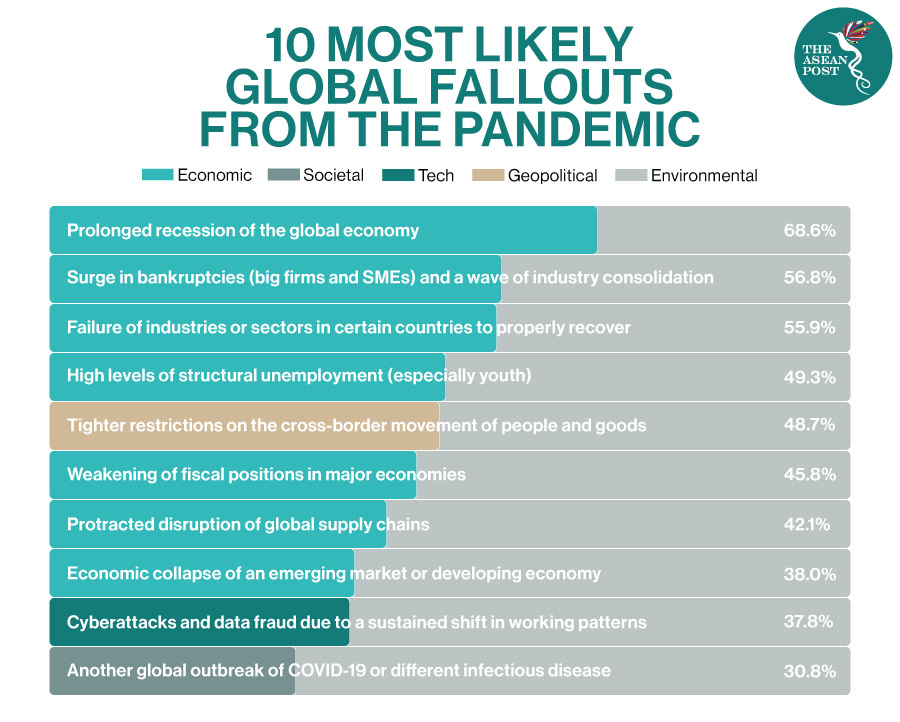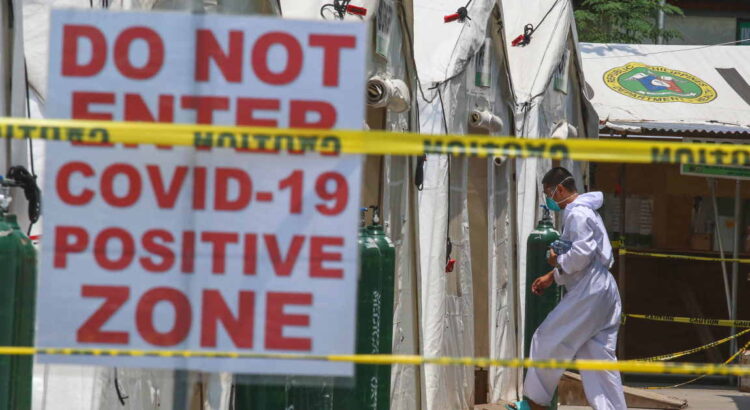What Do Professionals Worry Most About COVID?
Other than preying on humans, the deadly COVID-19 virus has severely affected livelihoods, local businesses and the economy in general. Major industries such as tourism and hospitality have been hit hard by the pandemic. Many have also lost their jobs or have been furloughed amid the health crisis.
A 2020 report by the World Economic Forum (WEF) in partnership with global professional services group, Marsh & McLennan and the Zurich Insurance Group titled, ‘COVID-19 Risks Outlook: A Preliminary Mapping and Its Implications’ tapped into the views of nearly 350 senior risk professionals who were asked to look at the next 18 months and rank their biggest concerns in terms of likelihood and impact for the world and for business.
According to the report, the economic fallout from the COVID-19 pandemic dominates companies’ risks perceptions. Two-thirds of professionals identified a prolonged global recession as the number one worry for businesses. Whereas some cited the increase in data fraud, breakdown of IT infrastructure, and another pandemic as critical concerns.
Prolonged Recession
Last November, it was reported that Indonesia, Southeast Asia’s biggest economy had fallen into its first recession in 22 years as the coronavirus pandemic continues to take its toll. The archipelago in 2020 saw growth fall 3.49 percent in the third quarter of the year compared to the same period in 2019. A fall of 5.32 percent in the second quarter of 2020, had effectively pushed the country into a recession.
Indonesia is not the only country to have experienced a recession last year. According to media reports, most economies in the region have been affected and most of them have not suffered a recession since the Asian financial crisis of 1998.
In August 2020, it was reported that Southeast Asia’s second largest economy, Thailand, contracted the most in more than two decades, deepening its recession. In an article published in December, Kirida Bhaopichitr, a Research Director at the Thailand Development Research Institute, projected that the Thai economy will grow in 2021 after contracting by almost 10 percent in 2020. However, she noted that should the kingdom face another wave of COVID-19, or if effective vaccines are delayed, the recovery could be slower than anticipated.
Unfortunately, Thailand is currently in the midst of tackling a new wave of coronavirus cases and the arrival of a highly contagious variant.

Cyberattacks
One of the most worrisome fallouts for companies according to the WEF report is the increase in cyberattacks and data fraud. COVID-19 has accelerated the adoption of a digital culture worldwide. From people using computer gadgets to work from home, to contact tracking applications and devices, fast data exchange and processing, technology has been a vital part of the response to the pandemic.
This means that cyberattacks and data fraud are likely to happen more often. A simple example is this; the demand for information on COVID-19, accompanied by fear and anxiety has created opportunities for cyber criminals to deliver malware (malicious software such as viruses), ransomware (a type of malware that threatens to publish the victim’s data unless a ransom is paid) and phishing scams (fraudulent attempt to obtain sensitive information).
“The techno-optimism that accompanied the rise of the internet was already dampened by rising cybercrime, concerns about the security of networked technologies, the risk of cyberwar and suspicions about data manipulation to shape perceptions. As the COVID-19 crisis accelerates dependency on technologically-enabled economic processes, it is also exacerbating those cyber-risks,” stated the WEF in the report.
Another Outbreak
To date, over 134 million people have been infected with the deadly COVID-19 virus which has already laid claim to over two million lives. In order to flatten the coronavirus curve, governments across the globe have imposed strict measures such as nationwide lockdowns and travel curbs. Fortunately, these measures seem to be working for most countries.
However, based on WEF data, around 30 percent of respondents worry that another global outbreak of the disease or a different infectious virus will arise. This could include a fresh wave of infections – as Thailand is currently facing – and coronavirus variants such as the B.1.1.7, first identified in the United Kingdom (UK) and B.1.351, first identified in South Africa.
According to Yong Poovorawan, a government expert and virologist at Chulalongkorn University, the UK variant “is very viral and can spread 1.7 times faster than the usual strain.”
Other top concerns mentioned in the WEF report include high levels of unemployment, tighter restrictions on the cross-border movement of people and goods, and disruption of global supply chains. These are definitely valid concerns amid the pandemic.
Fuente de la Información: https://theaseanpost.com/article/what-do-professionals-worry-most-about-covid







 Users Today : 163
Users Today : 163 Total Users : 35459758
Total Users : 35459758 Views Today : 315
Views Today : 315 Total views : 3418287
Total views : 3418287